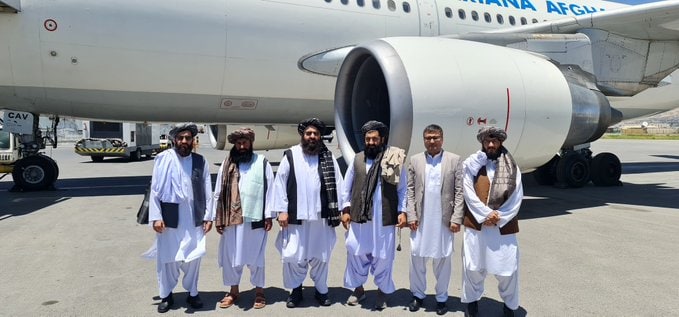US-Afghanistan Resumption of Talks
Now, Afghanistan (Taliban) should shape the game by managing the two sides of the Ukraine issue. They should not lose the regional powers by getting closer to America, but America still has a say in Afghanistan

The main point: negotiations are US-centric, and are part of the regional political game.
On Wednesday (29 June), Amir Khan Muttaqi, acting Minister of Foreign Affairs of Afghanistan, headed a delegation—including representatives of the Central Bank and the Ministry of Finance—to Qatar for talks with the American delegation, which included the representatives of the US Treasury and the US Special Representative on Afghanistan Affairs.
1) The purpose of the negotiations:
1-1 Political, economic, and security negotiations
1-2 Reaching an agreement on frozen funds
1-3 Discussing regional security
1-4 Ways to recognize Afghanistan (Taliban) which will be proposed by Afghanistan
1–5 Additional assistance to flood victims in southern Afghanistan (earthquake victims)
2) Main issues of the negotiations:
2-1 The main topic of discussion during the talks is methods of political interaction, as the delegation is led by Afghanistan’s Acting Minister of Foreign Affairs (Taliban).
2-2 Economic issues will move on according to political discussions.
2-3 Economic issues revolve around political talk.
3) Transferring frozen money to a third country:
3-1 To avoid the pressure of unfreeing the frozen funds of Afghanistan and the conditions created after the Ukraine crisis in the region, America is investigating the possibility of transferring these funds to a third country.
3-2 Afghanistan (Taliban) will suggest unfreezing the funds
3-3 America keeps the blocked money as a leverage wherever it would be possible
3-4 The transfer of blocked funds will bring out the negotiations from a neutral-statehood and will be regarded as success.
4) Why negotiations:
4-1 These negotiations are formed within political games and form a part of America’s policy in South Asia.
4-2 The regional changes regarding Afghanistan provoked such negotiations.
4-3 The movements of regional powers, such as the message of the Chinese Foreign Minister to Afghanistan regarding aid and the start of projects, the visit of Russian President Putin to Tajikistan and Turkmenistan and participation in the summit of the Caspian Basin countries, the visit of the Indian delegation to Kabul and the opening of the Indian consulate in Kabul, and giving visas as well as conditions for the start of railway work by Iran in the northwest of the country
5) America’s movements in Afghanistan are proportional to these changes:
5-1 approval of $50 million in aid for flood victims in Afghanistan (this is incorrect; the correct one is for earthquake victims in the south).
5-2 The possibility and debate on transferring the frozen funds to a third country
5-3 Resuming direct and face-to-face negotiations with the Afghan (Ta-liban) government
6) Now, Afghanistan (Taliban) should shape the game by managing the two sides of the Ukraine issue. They should not lose the regional powers by getting closer to America, but America still has a say in Afghanistan. Non-recognition by the US has even forced Russia and China to suspend the recognition of Afghanistan’s (Taliban) rule. Managing the dispute between the two sides of the Ukraine issue and using this dispute according to the country’s national interests can bring great benefits to the country.
7) Warning:
To get rid of the political and economic hardships, one should not emotionally take steps from the cold world war to the hot world war, which is getting closer day-by-day. Afghanistan cannot afford to go for one side and be hostile to the other side.
The (Taliban) rule, civil society inside and outside the country, political parties, intellectuals, and people should not allow our home (Afghanistan) to become a place of revenge, force, and display of power because the situation smells blood, so it is better for us to manage our own crisis.